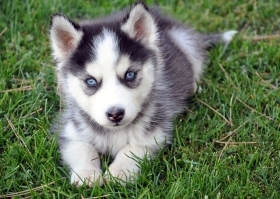By Linda Cole
It's easy to put off starting a training program for a new pup until after he's older. An eight week old puppy may still be a "baby," but he’s already learned a lot from his mom and siblings. His education needs to continue in his new home as soon as he gets there. Therefore, the best age to begin puppy training is the minute you get him home.
Puppies adjust quickly to new surroundings. Of course, he'll have a period of missing his siblings and mom. You can carry the scent of his old life with you to his new home by taking a baby blanket or towel with you when you pick him up. Rub it on his mom and siblings and let them play on it. When you arrive home, place it where you want him to sleep so he has familiar smells around him. Helping him get through his first few nights will be your first training session.
Create a den-like area in a crate and put the blanket or towel inside. With familiar smells to snuggle into, he'll feel more secure until new scents become familiar. To reassure him and let him know he's not alone, put the crate in your bedroom. It may be a rough couple of nights, but as he begins to feel comfortable in his surroundings, the whimpering will end.
The only difference between a well-trained puppy and one who isn't, is a commitment to begin a puppy training program as soon as you bring him home. His siblings have already taught him about bite inhibition. His mom taught him to listen to authority, and he's beginning to learn about social status in the family. The people who raised him taught him how to socialize with humans, and he learned about his surroundings by exploring. He's ready and eager to learn whatever you are willing to teach him.
Puppy training begins with housebreaking, which is usually the only training some owners are concerned with until the pup is older. Getting into the habit of the puppy learning and you teaching from day one helps the bonding process and lets him know who is in charge. There is a hierarchy among dogs where someone is in charge. When no one steps forward, some dogs feel it's their job to take the lead role. Establishing yourself as his leader while he's still a puppy lets him be just a puppy that looks to you to guide him. He's eager to please and learn.
Bonding is essential in any relationship, human or pet. That's how you earn trust and respect. Puppy training and playing go hand in hand when forming a bond. You can take the opportunity during play to also teach your puppy how you expect him to behave. To keep your puppy from developing bad habits that can turn into behavioral problems later on, housebreaking, biting and chewing all need to be dealt with in the early stages. A dominant pup that shows early signs of aggression can be dealt with through proper training that lets him know his behavior is not acceptable.
Puppy training means you are working with your pup every day and learning who he is as an individual dog. He has a unique personality and you are learning how he might react in different situations. Working with him helps you recognize behavioral issues that may start to show as he grows older, and you can correct them before they become a problem. Catching bad behavior while a dog is still young is much easier to correct. Teaching him it's not okay to bite can save your fingers or toes and stop an excited puppy from hurting someone in the family.
All puppies should be taught basic commands. They should come when called and understand what “NO” means. Training sessions should be short, because a pup doesn't have a long attention span. Make it fun so he thinks it's a game. Puppies are just like adult dogs. They want to please their human and can learn just as well as an adult. Knowing what you mean when you command him to sit, stay, drop it and come are all basic commands that could save his life one day. Positive reinforcement techniques that allow the puppy to succeed helps give him confidence and he grows up with good feelings about himself and you.
Training a puppy requires patience and commitment. Puppy training is important and you might as well begin now because he's learning every day. Make sure he's learning what you want him to learn, and enjoy the eight stages of puppyhood.
Read more articles by Linda Cole
At What Age Should You Begin Puppy Training?
Labels:
basic commands,
canidae,
dog training,
Linda Cole,
new puppy

